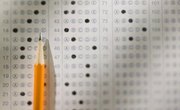The process of education is a cycle between teacher and student that is continually moving. The education process focuses on planning, delivery and assessment, and both teacher and student are continually assessing whether or not the content and delivery was successful.
For the teacher, it is important to determine if the students received the information, retained it and were able to process it. For students, the process often involves making the determination as to whether or not the content was effectively presented and whether or not the information was retained. This determination is typically made through an assessment.
Assessments come in many forms. Typically, in a classroom, teachers will use a combination of teacher-made tests, informal assessments, standardized tests and performance-based assessments. As with all assessments, there are advantages and disadvantages of performance assessments.
Performance-Based Assessments
A performance-based assessment measures a student’s ability to apply the skills learned in an authentic way. The purpose of performance-based assessments is to determine a student’s strengths or highlight a particular skill. A rubric may give some structure to this type of assessment. However, performance assessments typically allow for high levels of student input and creativity.
Examples of performance-based assessments include:
- Portfolio – A collection of student work over a period of time that usually highlights a specific strength or skill.
- Interview – A question-and-answer meeting between a student and teacher or student and admissions officer.
- Project – A hands-on creation related to a specific subject, concept or skill. Options could be endless and offer high levels of creativity.
- Presentation – A lecture, demonstration or panel discussion about a specific topic or concept.
Performance assessment in the classroom is offered as an alternative assessment measure. For teachers to truly understand the complete abilities of students, there should be a variety of assessment instruments used.
Advantages of Performance-Based Assessments
There are many reasons teachers should incorporate performance-based assessments in class. This type of assessment has many advantages:
- Direct observation of student ability
- Active student engagement
- Student choice
- Flexibility
- Authentic assessment of ability
Disadvantages of Performance-Based Assessments
While performance assessments are important in creating a holistic look at a student’s overall performance, these assessments can’t necessarily be used in the same way as standardized assessments. As with any assessment tool, there are disadvantages of performance-based assessment.
Performance assessments often rely on a specific skill set of the student, such as creativity, flexibility or a willingness to engage in public speaking. Performance-based assessments have disadvantages for students who may not feel overly creative or willing to present their knowledge in front of a large group.
Other disadvantages of performance-based assessments include:
- Can be very time consuming
- Can possibly be costly
- Relies heavily on student initiative and drive
- Relies heavily on specific skill sets of students
- Results can be subjective
Advantages and Disadvantages of Tests That Are Objective
Standardized tests provide an objective and reliable measure of student ability and achievement. These types of objective tests have gone through an extremely strict norming process in order to provide results that are statistically reliable and valid. Because standardized tests are valid and reliable, the scores have a variety of uses. Standardized test scores are a staple for high school placement and college admissions.
However, the main drawback of standardized tests is that not all students are successful at taking standardized tests. Therefore, they do not score well on them. However, the low scores are not reflective of their actual ability. Thus, this type of assessment does not accurately reflect their true abilities.
Opponents of standardized tests feel that these types of tests focus too narrowly on a few skills, do not provide a full representation of overall student achievement and should not be a central factor in the education process.
Related Articles
References
Writer Bio
Melanie Forstall has a doctorate in education and has worked in the field of education for over 20 years. She has been a teacher, grant writer, program director, and higher education instructor. She is a freelance writer specializing in education, and education related content. She writes for We Are Teachers, School Leaders Now, Classroom, Pocket Sense, local parenting magazines, and other professional academic outlets. Additionally, she has co-authored book chapters specializing in providing services for students with disabilities.










